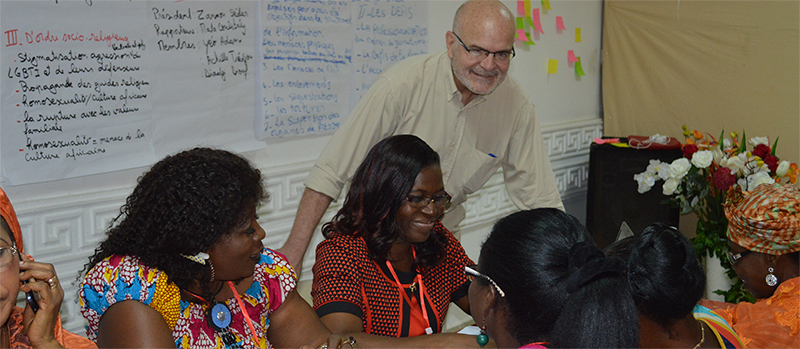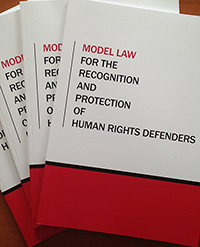
Groundbreaking Model Law to recognise and protect human rights defenders
Developed in consultation with over 500 defenders from every region, and settled and adopted by 28 of the world’s leading human rights experts and jurists, the Model Law provides authoritative guidance to States on how to implement the UN Declaration on Human Rights Defenders at the national level. It also provides an influential new tool for civil society to promote, evaluate and report on implementation.
(Geneva) – ISHR today launched a groundbreaking Model National Law which countries will be able to use to create or improve their own legal protections for human rights defenders.
Developed in consultation with over 500 defenders from every region, and settled and adopted by 28 of the world’s leading human rights experts and jurists, the Model Law for the Recognition and Protection of Human Rights Defenders provides authoritative guidance to States on how to implement the UN Declaration on Human Rights Defenders at the national level. It also provides an influential new tool for civil society to promote, evaluate and report on implementation.
A powerful and important new tool
‘The Model Law will be a powerful and important new tool in the hands of both human rights defenders and governments,’ said UN Special Rapporteur on Human Rights Defenders, Michel Forst, one of the experts endorsing the Law.
Fellow expert, Kamala Chandrakirana of the UN Working Group on Discrimination against Women in Law and in Practice, said, ‘The Model Law will trigger and open the space for discussion as to how to effectively protect human rights defenders.’
‘We urge all States to legislate and implement this Model Law,’ added Guadalupe Marengo, Head of the Global Human Rights Defenders Team with Amnesty International, and another expert to endorse the Law.
Development of law informed by more than 500 human rights defenders and 28 high-level experts
The Model Law was developed over a three year period and informed by inputs including:
- A comprehensive analysis of international and regional human rights instruments, together with relevant resolutions and recommendations from the UN Human Rights Council, Special Rapporteurs and treaty bodies, the African Commission on Human and Peoples’ Rights, and the Inter-American Commission on Human Rights
- Comparative legal research across more than 40 jurisdictions
- Face-to-face consultations with more than 500 human rights defenders from over 110 States, representing all regions and sub-regions, captured in a detailed report of the consultations, as well as a summary report of the findings of the consultations.
- An in-depth research and monitoring mission to Mexico to examine the operation and effectiveness of that country’s human rights defender protection law
- Expert drafting and pro bono legal assistance from leading international law firm Freshfields Bruckhaus Deringer
- Detailed revision, discussion and adoption by 27 high-level legal experts, including over a three day meeting

‘I fully endorse this Model Law and especially wish to thank the members of the ISHR team, whose work has from the outset been truly outstanding,’ said Sir Nicolas Bratza, former President of the European Court of Human Rights.
‘The effort undertaken by ISHR over the past years to elaborate this Model Law will contribute to advancing the right to protect human rights worldwide and to do it without fear,’ added Mauricio Angel of Protection International.
High Commissioner says legal recognition of defenders an indispensable element of their protection
The launch of the Model Law coincides with the launch of a new report by the UN High Commissioner for Human Rights on the key elements of a safe and enabling environment for defenders and other civil society actors. Foremost among the elements identified in the report is ensuring a ‘supportive legal framework and effective access to justice’.
In the report, the High Commissioner concludes that the legal recognition of the rights to freedom of opinion, expression, peaceful assembly, association and participation in public affairs is essential to the protection, exercise and realisation of all other human rights. Accordingly, the High Commissioner says, States should enact specific laws on the protection of human rights defenders, ‘review and repeal or amend all legal provisions that impede the free and independent work of civil society actors’ and ‘ensure that all legislation affecting their ability to work complies with relevant international human rights laws and standards and with the Declaration on Human Rights Defenders’.
Model Law comprehensive but adaptable; will assist States to comply with international obligations
The Model Law adopted by the 28 high-level experts will assist States to implement these recommendations and contains detailed, precise legal provisions relating to:
- The rights of human rights defenders and the responsibility to defend rights
- The obligations of States and public authorities to protect and enable the work of defenders and to prevent, investigate and remedy violations against them
- The establishment of a Mechanism for the Protection of Human Rights Defenders
The provisions, each of which is accompanied by a commentary, are drafted in such a way as to be adaptable to different national legal contexts, systems and traditions.
The Model Law also contains detailed annexures with model provisions on the effective operation of a protection mechanism, and processes and principles to ensure that other laws are developed, interpreted and applied compatibly with the Model Law.
‘The Model Law on the Recognition and Protection of Human Rights Defenders is comprehensive and substantive. I am confident that it will provide a valuable tool for human rights defenders in their domestic jurisdictions,’ said leading Indian human rights lawyer and defender Vrinda Grover.
Legal protection of defenders needs to be complemented by other measures
ISHR launches the law recognising that the enactment of a specific human rights defender protection laws is a vital but in itself insufficient measure to ensure a safe and enabling environment for defenders. Such laws need to be accompanied by high-level political support and adequate resources for their implementation.
They also need to be complemented by a range of other measures, including strong, independent and effective judiciaries and national human rights institutions, close attention to the particular situation and protection needs of women human rights defenders, and safe and open access to UN and regional human rights mechanisms.
‘The legal recognition and protection of defenders is crucial to ensuring that they can work in a safe, supportive environment and be free from attacks, reprisals and unreasonable restrictions. The legal recognition and protection of defenders also contributes to the broader goals of upholding human rights, and promoting democracy, good government, sustainable development and respect for the rule of law,’ said ISHR Director Phil Lynch.
‘The enactment of this Model Law, therefore, will not just serve and pursue the interests of rights holders and victims of violations, but of society as a whole,’ Mr Lynch said.
Following the launch, ISHR will now work with national and regional partners towards the enactment of the Model Law in a number of jurisdictions, including Burkina Faso, Mali, Niger and Sierra Leone. It is our hope and aspiration, however, that it is used by a diverse and dynamic range of defenders, together with progressive governments and policy makers across the world, to ensure the effective implementation of the Declaration on Human Rights Defenders at the national level.
28 high-level experts from all regions endorse Model Law
The 28 experts formally endorsing the Model Law, many of whom were involved in the negotiation of the Declaration itself, are:
- Olga Abramenko, Expert, ADC Memorial
- Reine Alapini-Gansou, Special Rapporteur on Human Rights Defenders, African Commission on Human & Peoples’ Rights
- Mauricio Angel, Head of Policy, Research and Training Unit, Protection International
- Sir Nicolas Bratza, former President of the European Court of Human Rights
- Kamala Chandrakirana, Member of the UN Working Group on Discrimination Against Women in Law and in Practice, and former Chairperson and Secretary-General, Indonesia’s National Commission on Violence Against Women
- Luis Enrique Eguren Fernandez, Board Member, Protection International
- Michel Forst, UN Special Rapporteur on the Situation of Human Rights Defenders
- Olivier de Frouville, Professeur de droit public, Directeur du C.R.D.H. Université Panthéon-Assas, and Member of the UN Human Rights Committee
- Vrinda Grover, human rights lawyer and activist, Board Member of the Fund for Global Human Rights, and Bureau Member of South Asians for Human Rights
- Daniel Joloy, Mexican human rights defender and Senior Policy Adviser, Amnesty International
- Yanghee Lee, UN Special Rapporteur on the Situation of Human Rights in Myanmar
- Philip Lynch, Director, International Service for Human Rights
- Guadalupe Marengo, Deputy Director, Head of Global Human Rights Defenders Team, Amnesty International
- Alice Mogwe, Director, Ditshwanelo (The Botswana Centre for Human Rights)
- Andrea Rocca, Head of Protection, Front Line Defenders
- Claudia Virginia Samayoa, Founder and Coordinator of Unidad de Protección de Defensoras y Defensores de Derechos Humanos Guatemala – UDEFEGUA (Human Rights Defenders Protection Unit in Guatemala)
- James Savage, Program Officer, Enabling Environment for Human Rights Defenders, The Fund for Global Human Rights
- Margaret Sekaggya, Executive Director of the Human Rights Centre Uganda, former UN Special Rapporteur on the Situation of Human Rights Defenders
- Hassan Shire Sheikh, Chairperson of DefendDefenders
- Michael Ineichen, Programme Manager (Corporate Accountability) and Human Rights Council Advocacy Director, International Service for Human Rights
- Navi Pillay, former UN High Commissioner for Human Rights
- Otto Saki, Senior Legal Adviser, Africa Regional Office, International Commission of Jurists
- Patricia Schulz, Member of the UN Committee on the Elimination of Discrimination Against Women
- Chris Sidoti, International human rights consultant, Board Member of the OHCHR Voluntary Fund for Technical Cooperation in the Field of Human Rights, and former Australian Human Rights Commissioner
- Gerald Staberock, Secretary-General, World Organisation Against Torture
- Wilder Tayler, Secretary-General, International Commission of Jurists
- Jean-Daniel Vigny, Expert consultant on international human rights issues for the Swiss Ministry of Foreign Affairs
- Clément Voule, Vice-Chair of the West African Human Rights Defender Network, and member of the African Commission Working Group on extractive industries, environment & human rights violations
